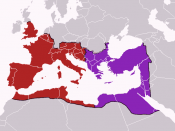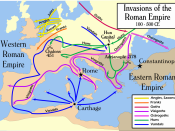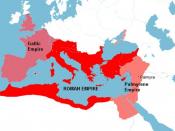CONSTANTINE (312-337AD)ÃÂson of ContantiusÃÂbecame involved with a civil warÃÂ took army to Italy in 312 and came out victorious after battle at Milvian Bridge in RomeÃÂCompromised with Licinius to share controlÃÂConverted to Christianity after he became after he became AugustusÃÂAll religions were allowed during his reignÃÂDefeated Licinius when he began persecuting Christians, then became sole emperorÃÂBuilt capital in 330 BC in modern day turkey called it ConstantinopleCONSTANTINES SUCCESSORSÃÂAfter ConstantineÃÂs death his three sons divided the empireÃÂConstantine II was killed in a battle and Constans and Constantius divided the empire between themÃÂGreat armies of Gaul and Danube almost got demolished during a battle between Constantius and a usurperÃÂJulian, the successor of Constantius tried to unify the empire with paganism instead of ChristianityÃÂDied when trying to defend eastern borders against PersiansÃÂAll successors of Julian were ChristiansTHE 5TH CENTURY INVASIONSÃÂWhile roman emperors were worried about their empire and dynastic struggles (religion etc)ÃÂThe Huns were invading western EuropeÃÂSince Huns fought on horse back, they easily defeated GermansÃÂRomans allowed the Visigoths (western Germans) to refuge in the roman bordersÃÂVisigoths complained about the bureaucratic officials treating them badlyÃÂNo action was takenÃÂThey rode in 378 and defeated imperial army (led by Valens at Adrianople)ÃÂBattles between Romans and Visigoths led to roman empire end in the westÃÂVisigoths entered and destroyed Rome in 410ÃÂThat brought a complete end to the western roman empireÃÂIn 476 Odoacer overthrew Romulus the last roman emperor and name himself kingÃÂEastern part of empire survived until 1453 and is what we call Byzantine empireTHE DECLINE AND FALL OF RomeÃÂSaint Augustine one of the first church father, wrote a book called ÃÂRomeÃÂs fall in the city of godÃÂÃÂIt was an analysis of RomeÃÂs fallÃÂSince then many writer wrote about the decline of RomeÃÂThere is no major reason why Rome declinedECONOMIC AND SOCIAL CONDITIONSÃÂRome suffered an economic crisis during the 2nd and 3rd centuriesÃÂThis is one of the reasons the empire fellÃÂThe emperors did not have enough money to pay their soldiers who were needed to defend the bordersÃÂAs a result there were harmful taxations and emperors could not provide peace neededÃÂSlavery also played an important part of economic instability in the empireÃÂThe used of slaves prevented them from creating and coming up with new inventions, therefore there was little varied of goods produce in the empireÃÂThis led to little trade and commerceÃÂFrequent civil wars broke down trade routesÃÂby the middle of 3rd century these routes were almost no passableÃÂin 250-270 a plague demolished the European population = to more povertyÃÂin 285-305, Diocletian began controlling even the economic aspect of peopleÃÂs livesotaxed heavilyoforced children to follow same route as father so that they would pay the same amountomany families became bankruptomany went to countryside and created self-sufficient manor farmsSUCCESIONS PROBLEMSÃÂCivil wars were the bulk contribution the decline of the empireÃÂThese consumed valuable troops and gave Persians and Germans an opportunity to obtain roman territoryÃÂTrajan changed the rule that only roman or Italian candidates could become emperorÃÂMore candidates appearedÃÂRome got some of the best rulersÃÂIn order to end economic struggles, Diocletian began a system that stated that the next emperor would be chosen by merit instead of bloodÃÂArmies did not lose loyalty to leaderÃÂShowed it by being loyal to DiocletianÃÂs successorsTHE BARBARIANS AND THE PERSIANSÃÂThreats of invasions from the east was another factor of RomeÃÂs inability to defend its western bordersÃÂThe Parthians were not strong enough to control the roman empire but they constant threatened the RomansÃÂSassanians then took over the Parthian and extended religious freedom to Jews, ChristiansÃÂHad sympathy to those who were persecuted by the RomansÃÂWere often victorious over the roman troops in Syria, Palestine, Cappodicia and Mesopotamia.
Works citedAnatole, and John . People and Nations. Holt Rinehart, 1993.


